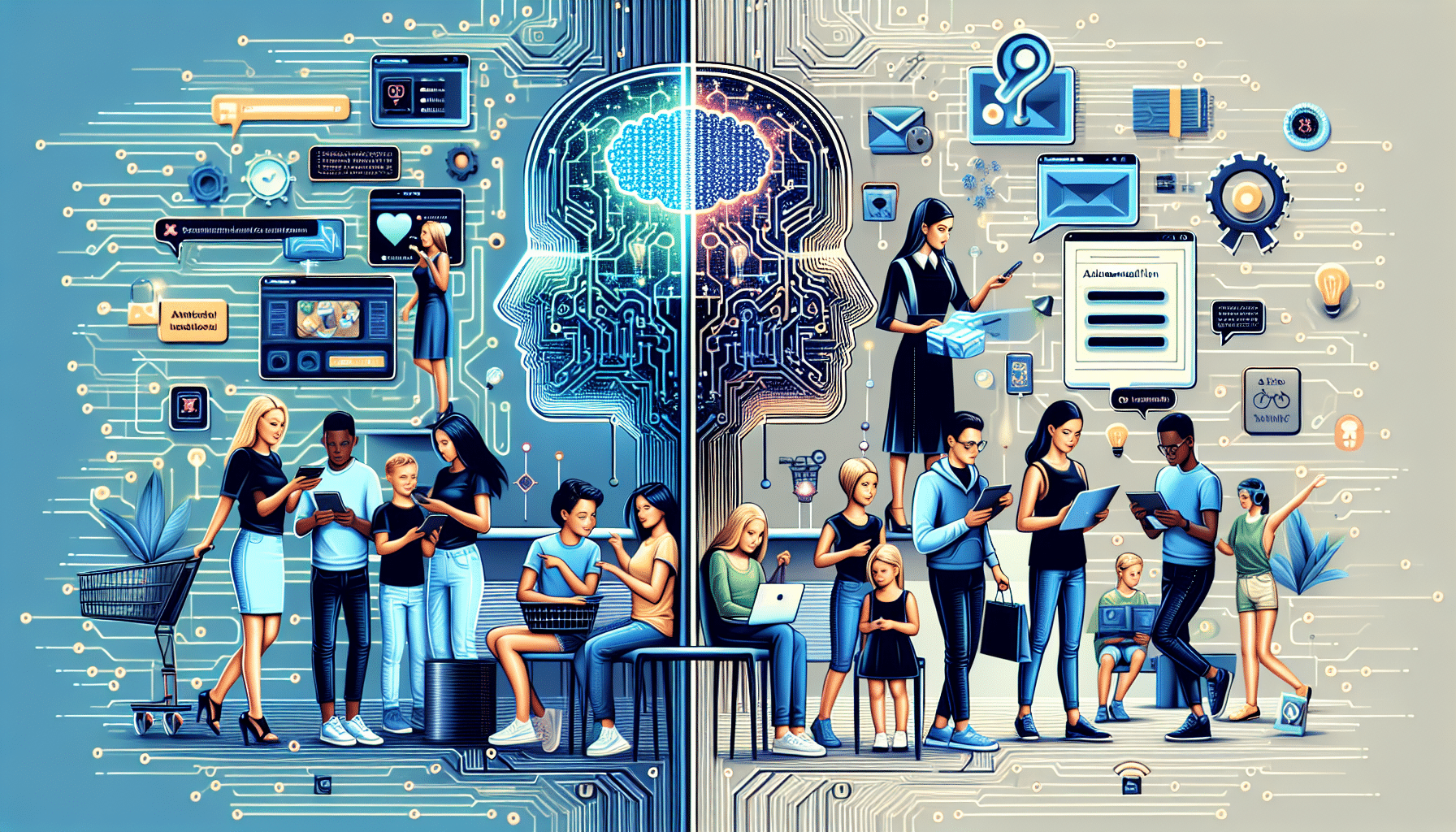When I first started exploring AI automation, I was amazed by its potential to change everyday tasks, especially in shopping and learning. Imagine, as a solopreneur, juggling many hats while trying to stay ahead of the curve. AI automation feels like a lifesaver. It can help simplify processes and even boost creativity in business. In the world of shopping, AI tools have helped people save big. Adobe Analytics reported that in November 2024, online spending broke records, reaching a whopping $77 billion in just 24 days. From tailored product suggestions to unbeatable deals, AI chatbots make shopping more personal and exciting. For learning, AI is stirring classrooms with chatbots that make lessons interactive and fun. The University of Oklahoma even backs this shift, seeing the value in AI-driven education. Stay tuned to discover how AI automation is reshaping the landscape and how you can leverage it for your ventures.
AI Automation in Legal Education
AI Chatbots Transforming Learning
AI automation is revolutionizing the educational landscape, particularly within legal education, through the integration of conversational AI chatbots. These innovative tools are reshaping traditional teaching methods by infusing an element of interactivity and engagement into the classroom experience. AI chatbots facilitate dynamic learning environments where students can interact in real-time, making quizzes more than just assessments but interactive discussions that reinforce learning. For example, legal education institutions have started adopting these intelligent systems to present legal scenarios, encouraging students to formulate responses or defenses, thereby enhancing their critical thinking skills and comprehension of complex legal principles.
Technology Leaders’ Endorsements
The endorsement of AI automation in education by influential academia leaders, such as those from the University of Oklahoma, underscores the growing confidence in these technologies as transformative educational aids. The director of technology innovation at the university advocates for the use of chatbots as a beneficial tool for enhancing student engagement, emphasizing their potential to simulate real-world legal scenarios that prepare students for practical applications in the legal field. By supporting AI chatbots in learning, educational leaders are not only championing a more modern approach to teaching but also preparing students to navigate a world where technology intertwines with every aspect of professional life, including the legal realm. This commitment highlights the pivotal role AI automation plays in driving forward-thinking educational strategies that align with future industry needs.
U.S. Consumer Spending and AI Automation
Holiday Spending Highlights
The holiday season of 2024 witnessed a remarkable surge in U.S. consumer online spending, breaking previous records with expenditures reaching over $77 billion in just the first 24 days of November. This impressive growth, as analyzed by Adobe Analytics, not only surpassed the previous year’s figures by a significant 9.6% but also exceeded Adobe’s seasonal forecast of 8.4% growth. Consumers contributed to this spike by routinely spending more than $3 billion daily across 21 out of the 24 days, indicating a robust trend toward increased online purchasing, spurred by attractive discounts and innovative shopping technologies.
How AI Influences Shopping
AI automation has become a pivotal player in transforming the shopping landscape, notably through tools that assist consumers in optimizing their purchasing decisions. Shoppers increasingly rely on AI-powered chatbots to enhance their online experience, leveraging these tools for advice, deal-finding, and product recommendations. These chatbots have evolved to become trusted shopping assistants, providing real-time responses and personalized suggestions, thus simplifying the buying process. This innovative use of AI not only enriches the consumer experience but also drives higher engagement and spending, as evidenced by the dramatic 1,700% increase in AI chatbot-led e-commerce referrals during this holiday season. This trend underscores the growing consumer preference for AI-enhanced interactions, paving the way for more personalized, efficient, and engaging online shopping experiences.
AI Automation in E-Commerce
Rise of AI Chatbots in Shopping
AI chatbots have fundamentally reshaped the e-commerce landscape, becoming indispensable tools for both consumers and retailers. By engaging with customers in real time, these digital assistants facilitate seamless interactions, providing answers, processing orders, and offering personalized recommendations. This direct engagement has precipitated an unprecedented 1,700% increase in referral sales, highlighting the efficacy of chatbots in driving conversions and enhancing customer satisfaction.
Tools like Intercom and Drift have been at the forefront, leveraging AI to elevate user experiences by ensuring quick resolution of queries and creating tailored shopping journeys. These platforms not only enhance customer loyalty but also streamline business operations by automating repetitive tasks, allowing human agents to focus on complex customer needs.
Predicting Future Shopping Trends
The future of shopping is inextricably linked with AI automation, which is set to further personalize and invigorate the e-commerce experience. Artificial intelligence will continue to refine its predictive analytics capabilities, offering consumers personalized suggestions that cater to their unique preferences and shopping history. This heightened personalization is expected to be a significant driver of consumer spending in the coming years.
Moreover, retail businesses are increasingly embracing AI to create immersive shopping experiences. Innovations such as augmented reality (AR) powered by AI will allow customers to virtually try on products, further bridging the gap between online and in-store experiences. As AI technology becomes more sophisticated, retailers who adopt these advancements will likely see a surge in customer engagement and a subsequent rise in sales, underscoring AI’s transformative role in the future of shopping.
Challenges and Considerations in AI Automation
Ensuring Ethical AI Use
In the realm of AI automation, maintaining ethical standards is crucial to prevent biases and protect privacy. As AI systems become more integrated into our daily lives, their algorithms must be designed to operate without implicit prejudices, which can inadvertently influence decision-making processes in ways that are not fair or transparent. Educational tools, like AI chatbots used in law schools, offer an opportunity to instill values of equality and objectivity in young minds. Educators and developers must collaborate to ensure these tools provide accurate and unbiased information. Additionally, respecting user rights involves maintaining user privacy and ensuring that any data collected is done with consent and securely handled.
Security in E-Commerce
As AI automation advances in e-commerce, the need for reinforced security measures becomes more pressing. The increasing use of AI chatbots in customer interactions necessitates robust cybersecurity protocols to prevent unauthorized access and protect user data. These AI systems play a pivotal role in detecting and mitigating fraudulent activities by analyzing patterns and anomalies in transaction data. Businesses must invest in comprehensive security infrastructures, employing encryption, multifactor authentication, and real-time threat detection systems. These precautions not only protect consumer information but also bolster consumer confidence in AI-driven platforms, ensuring a seamless and secure shopping experience.
FAQs on AI Automation
- How do AI chatbots improve law school learning?
- AI chatbots enhance law school education by providing immediate feedback and making quizzes interactive. They can present hypothetical legal scenarios and test students’ problem-solving skills in real-time. This interactivity not only makes learning more engaging but also helps students apply theoretical knowledge to practical situations. Tools like “Knowji” and “QuizBot” serve as excellent examples, leveraging natural language processing to assist students in retaining complex legal concepts through dialogue-based learning.
- What benefits do AI chatbots give to shoppers?
- Shoppers gain significantly from AI chatbots due to their ability to deliver personalized deals and product suggestions. These chatbots can analyze past purchasing behaviors and preferences, offering personalized recommendations that enhance the shopping experience. For instance, platforms like “Shopify Chat” or “Octane AI” provide businesses with chatbots that not only handle customer queries promptly but also suggest complementary products, driving higher conversion rates.
- What future trends are expected for AI in shopping?
- Future shopping trends are poised to be heavily influenced by advancements in mobile shopping and AI-driven buying decisions. With AI, personalization will reach new heights, tailoring the shopping experience based on predictive analytics. Expect features such as voice-activated shopping and image recognition for product identification to become mainstream, with technologies like “Vue.ai” leading the way in creating visually driven shopping experiences.
- What ethical issues should AI in education address?
- One of the primary ethical issues AI in education must tackle is the prevention of biases in algorithmic decision-making. AI systems should ensure fairness and equity in student evaluations and feedback. Addressing data privacy concerns is equally important, maintaining confidentiality of student information. Educational institutions need to implement rigorous standards and regular audits to ensure AI tools like “Kami” operate without compromising educational integrity or student privacy.
- How can businesses use AI chatbots to increase sales?
- Businesses can leverage AI chatbots to boost sales by creating personalized shopping experiences and executing targeted marketing strategies. By gathering customer data, chatbots can segment users and deliver tailored promotions or reminders, increasing the likelihood of purchase. Solutions like “Intercom” and “Drift” allow businesses to automate customer interactions with personalized messaging, nurturing leads throughout the sales funnel efficiently.
The strategic incorporation of AI automation, particularly through chatbots, presents both immense opportunities and challenges. Remaining abreast of ethical considerations and leveraging these sophisticated tools responsibly will ensure they serve as assets in both education and e-commerce.
AI automation is changing how we learn, shop, and sell. Chatbots make legal education fun, quiz students, and teach law and tech together. These tools also power shopping, breaking November 2024 spending records and enhancing customer experiences. With AI, shoppers find deals, and e-commerce sees a 1,700% sales boost. However, ethics and security remain key. Using AI wisely ensures privacy and fairness. Look to AI to create personal, secure, and engaging experiences. Dive into AI’s world; the future of education and shopping awaits your exploration.


